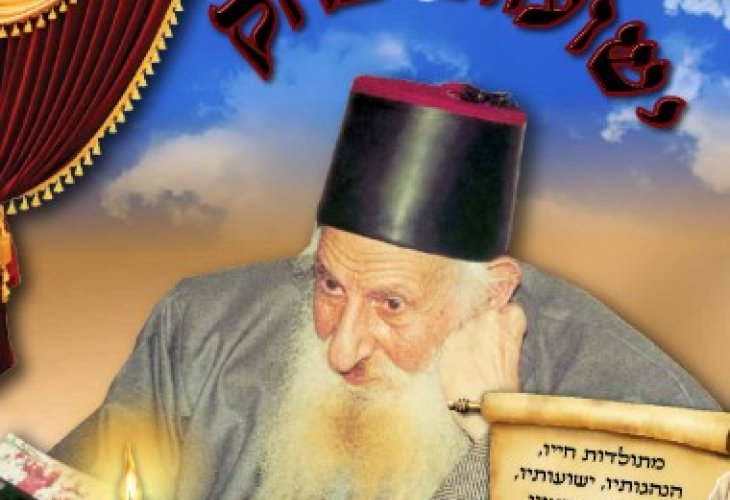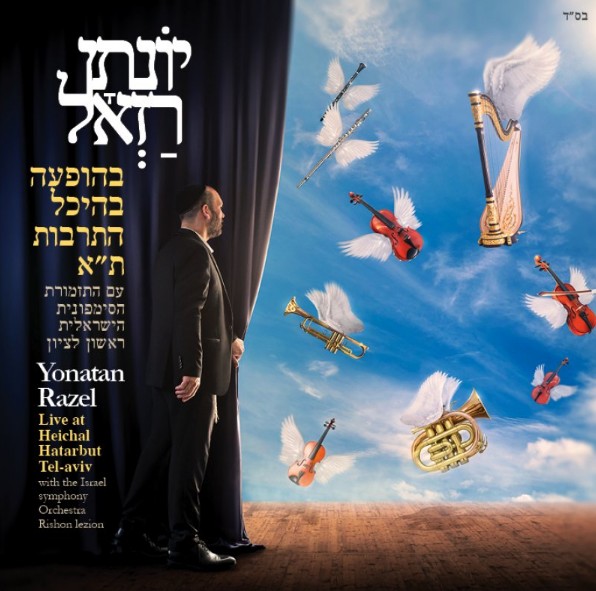Which Question Did Yonatan Razel Refuse to Answer in the Judaism Questionnaire by Hidabroot?
In celebration of his new live album launch, singer Yonatan Razel takes part in a Judaism questionnaire. What childhood memory stays with him, which biblical figure would he like to meet, and which question did he prefer to leave unanswered?

What childhood memory stays with you?
"When I was a child, we were driving south and got into a car accident. Our car completely flipped over. I was 12 then, but that memory stays with me to this day. Bedouin Arabs living in the area came to help. They gave us aid, provided water and first aid, and stayed with us until we calmed down and recovered. We kept in touch with them for a long time afterward. By some miracle, no one was hurt, truly by Hashem's grace, because it was a serious accident and the car was completely overturned. The clearest souvenir I have from that accident is Beethoven's Ninth Symphony, which I was in the middle of studying when the accident happened. Due to the accident, its notes are etched in my mind."
A Jewish point you personally connect with?
"I think I'm very connected to Rabbi Akiva, who returned to faith at such a late age and understood that anyone can change. This is a very fundamental Jewish point, that there is no limit to change and who you are. It's somewhat opposite to the idea of accepting yourself, as the Torah teaches us that you can actually change fundamental aspects of who you are."
What does Judaism mean to you?
"Judaism means everything to me. It's my entire life, why is that even a question? It's my relationship with myself, my spouse, and my children, it affects everything. It's the world I live in."

A mitzvah especially close to your heart?
"It's hard for me to say. Torah study, kindness, these are very personal matters for me, and it's a bit difficult to expose them. I think it's a very personal question."
Your favorite holiday?
"Purim. There is something about the unity and joy of this day. An inner joy and feeling that simply, and forgive me if this sounds too simplistic, that everything is good. On Purim, there's no repentance or fear of judgment. It's a day akin to Yom Kippur, but from a place of joy and love of Hashem. You can ask for anything on this day, rejoice, and even drink *l'chaim* from a place of holiness."
How present is Hashem in your life, and how does it affect your actions?
"This is too personal. It's hard for me to answer this question. It's somewhat, and forgive me if I'm exaggerating, borderline voyeurism and reality TV. If I share how and in what way Hashem affects me, it feels less genuine. This is a very personal question for me, as these are things I share with my wife, but I cannot share publicly. It is something very deep and intrinsic for me."
Which biblical figure would you like to meet?
"Abraham our patriarch. I think I previously mentioned that I am very connected to Rabbi Akiva, and I would love to meet him for a few minutes, but if we are talking about a biblical figure, I would very much like to meet Abraham. Something about his character, as the first and only one in the world, the first benefactor and believer, speaks to me a lot."
An interesting meeting or conversation you've had?
"I met Rabbi Chaim Kanievsky, who, in his usual holy manner, said a few short sentences which were very meaningful, even critical, to my life."
An interesting story that happened to you or you were a part of?
"When I was 15, I met the famous composer Leonard Bernstein, and it was a very significant encounter for me. The meeting was dizzying for a young boy. We spoke at length, I played him my compositions, and he talked to me about the meaning of being a conductor. He was someone I greatly admired professionally, and that meeting remains a fond memory to this day."
"Besides that, I had many other interesting encounters. Before getting married, after being released from the army, I traveled around the world and visited many Jewish communities across the globe. I was like a wandering singer before I started performing professionally. I remember meeting both non-Jews and Jews, and I had encounters that shaped my professional and Jewish connection. Among them, I met a couple who converted in the Czech Republic, in a remote city with hardly any Jews, and they told me they decided to convert after learning a course about the Holocaust. Something about the story of the Holocaust and the Jewish people seemed so incredible to them that they felt compelled to explore further. This process led them to Judaism, and they established a Jewish community in that city. I was just 23, after the army, and that meeting with two people who were led to Judaism by the Holocaust, which is one of the largest and most traumatic challenges for many, was amazing. I would hope to meet them again one day."
Professionally, are you where you imagined you would be?
"I never imagined I would reach so far, it's beyond my wildest dreams. I have no professional aspirations and never dreamed of such success. Everything that happened to me in my career is solely because Hashem leads me on this path. I never pushed or aspired to come this far."
What is your opinion about baalei teshuva? And how connected do you feel to baalei teshuva?
"I think in our generation it's a gift. There have always been baalei teshuva, but the way there are so many today is kind of a novelty. I am deeply connected to the people of Israel, but I have a special connection with baalei teshuva."
Tell us about your new album.
"It's a celebration for me. A kind of dream come true because it combines an amazing orchestra and an amazing audience. In a sense, it's not an album, but more a documentation of a moment in my career. An album for me is somewhat autobiographical, sharing with people in a somewhat secretive way, because it's my life, and this album is documentation of a performance, so it's like coming home for me. There are singers for whom a live performance with an orchestra is something one-time, but for me, it feels homely and familiar because I was a conductor for many years and worked as an orchestral arranger long before I was a singer. I produced similar shows for great singers like Arkadi Duchin and Shlomo Artzi, and only later I grew into being a singer, so for me, the live encounter and contact with the orchestra is something I am highly connected to. It's a kind of renewed meeting with myself because suddenly I am both the arranger, the singer, and the creator. There is something very exciting about it."

